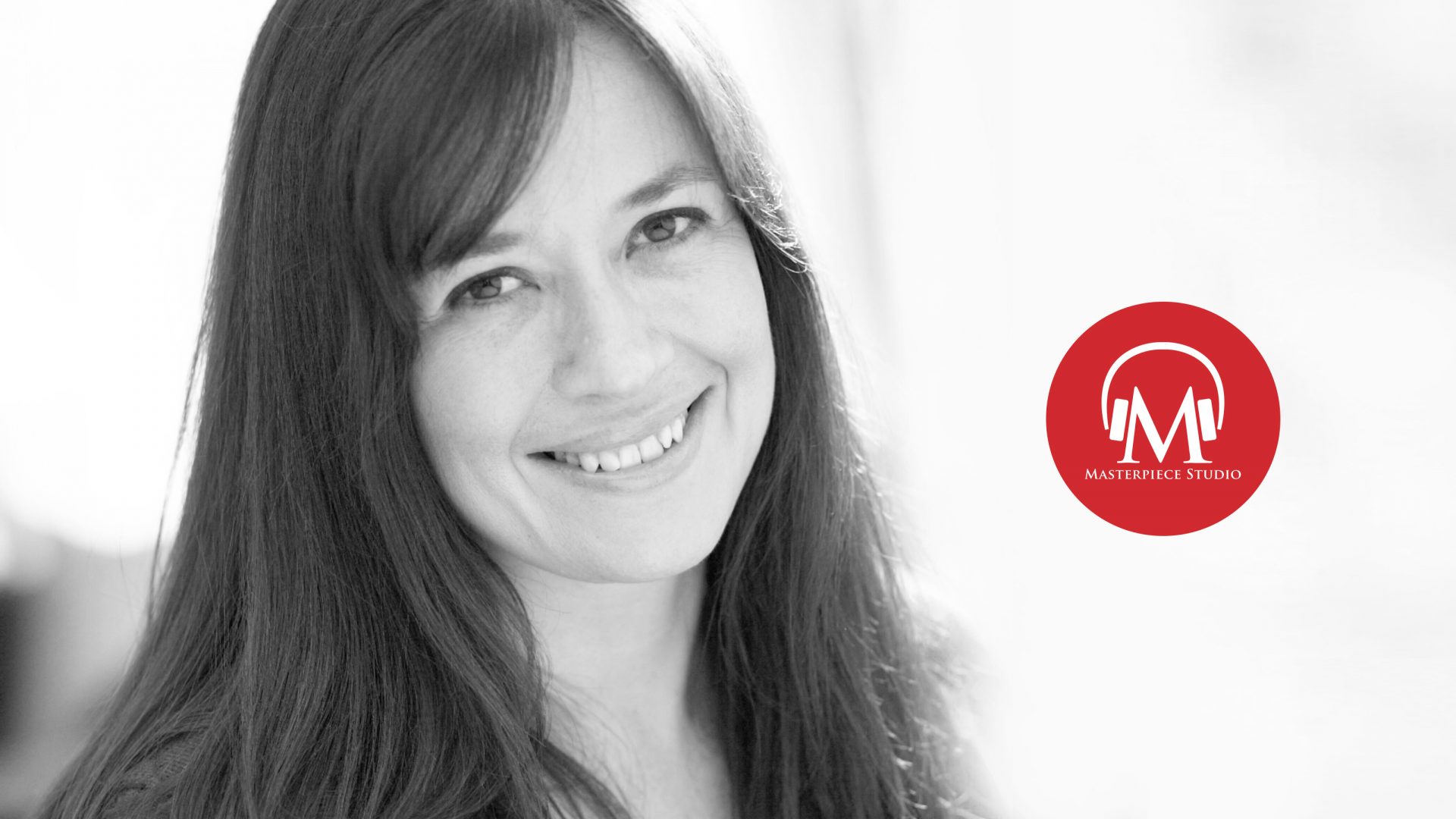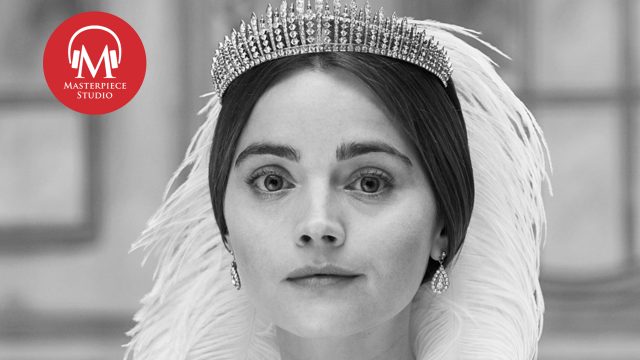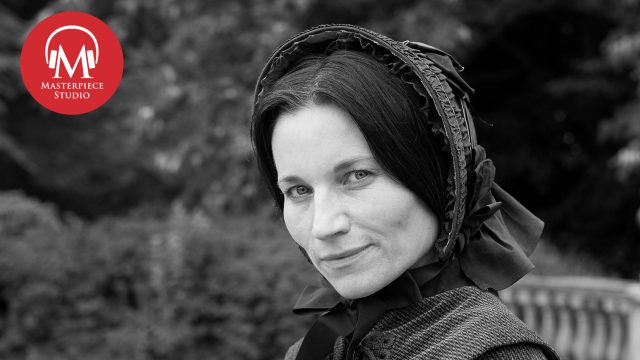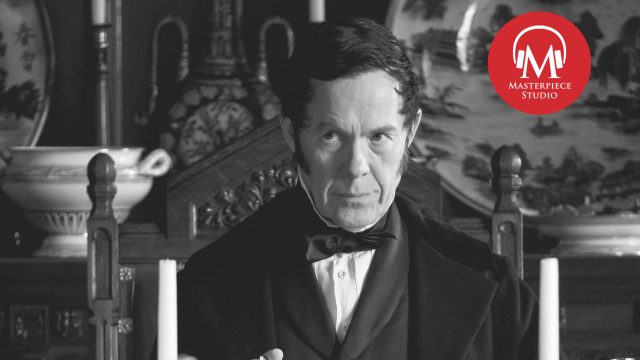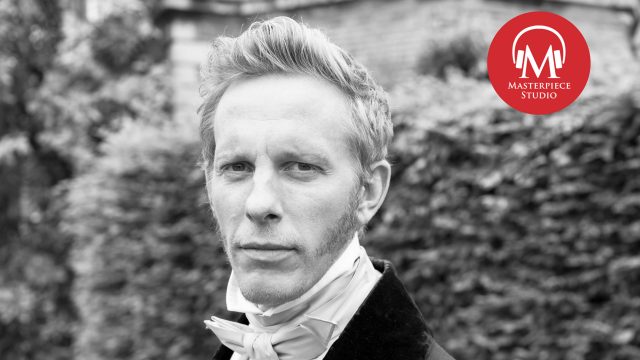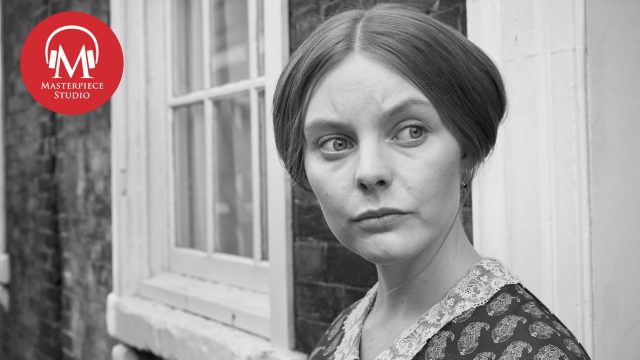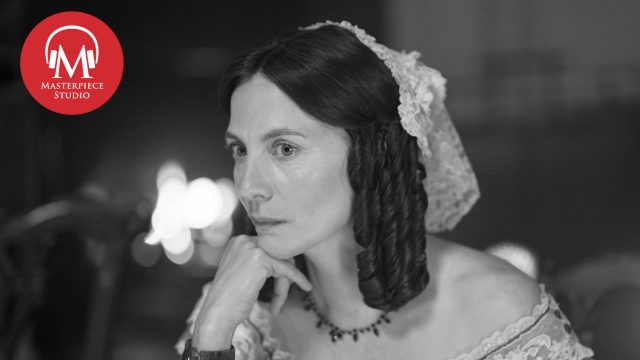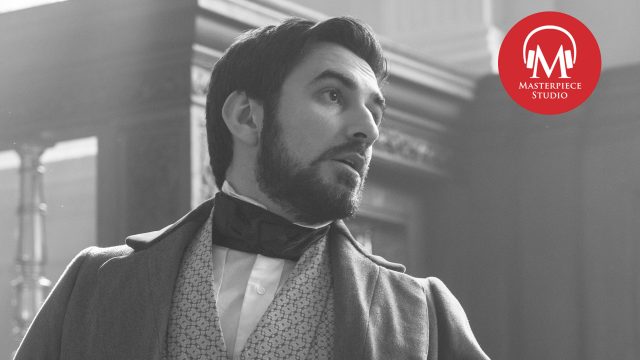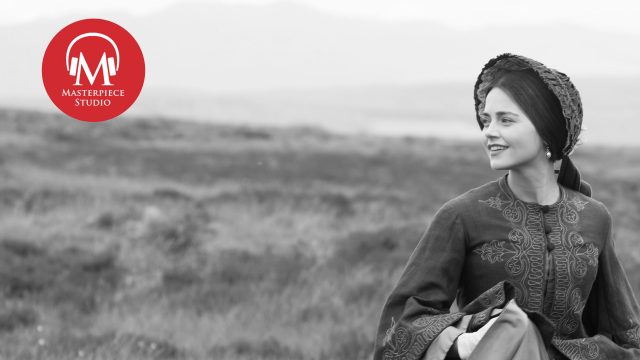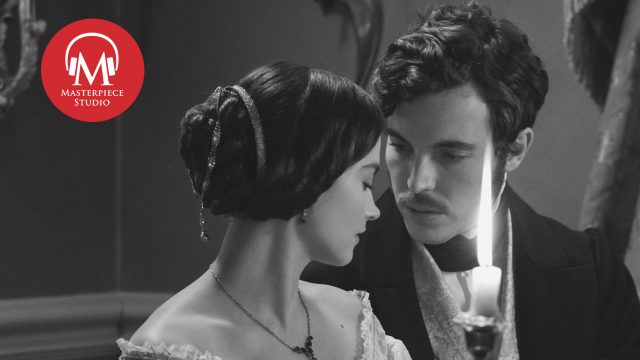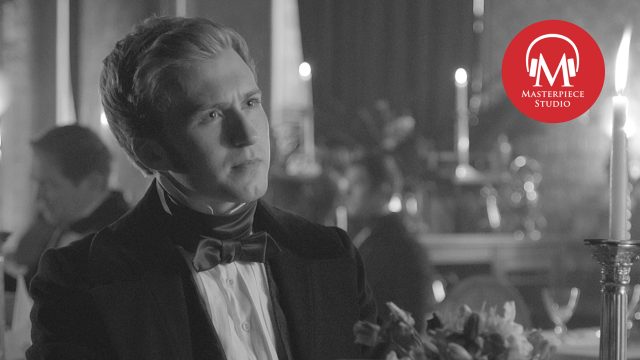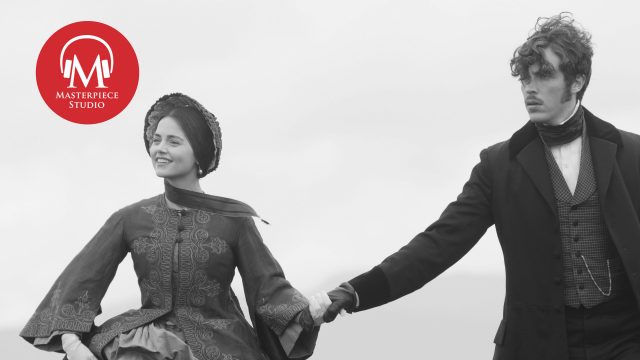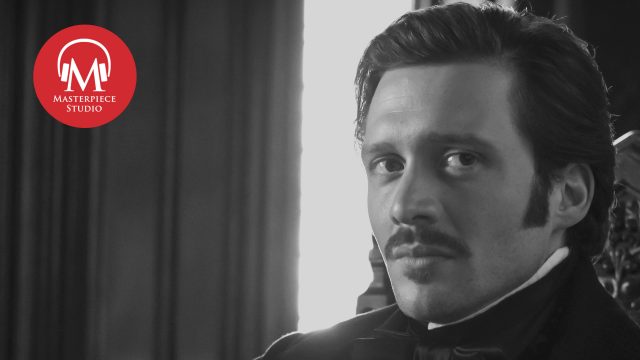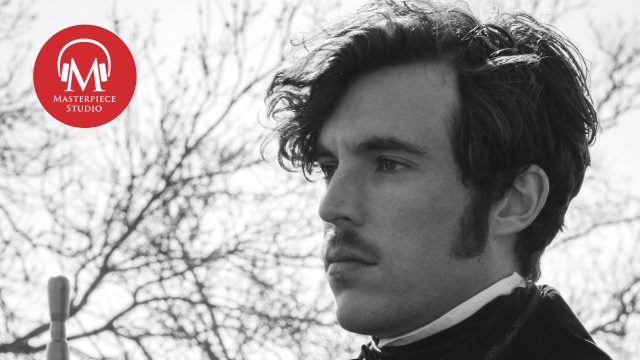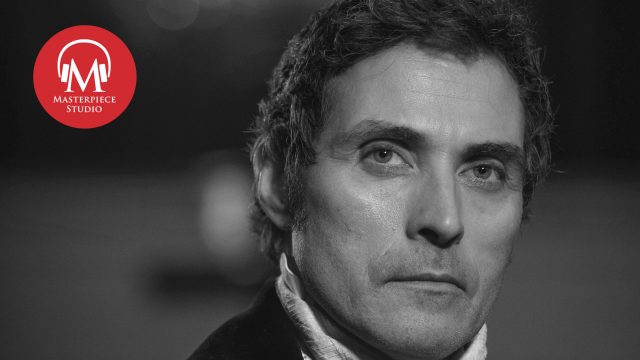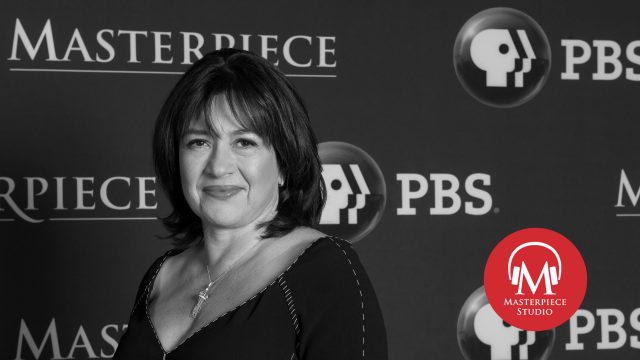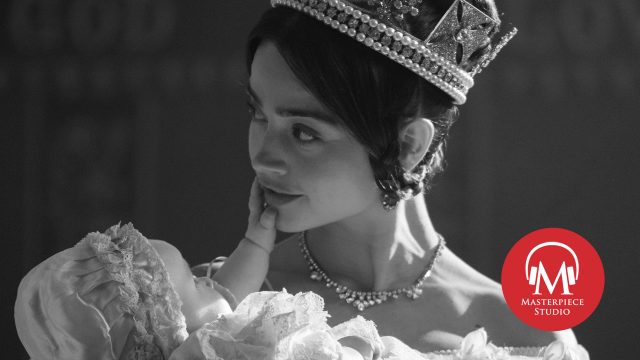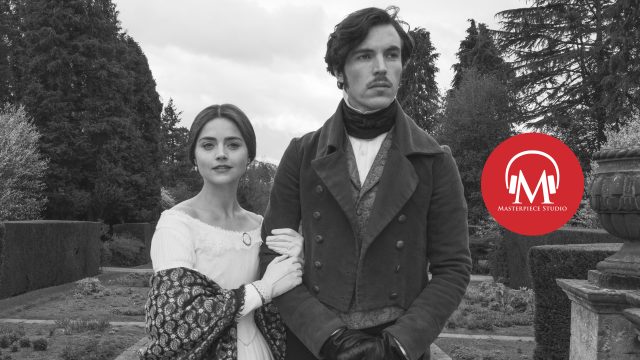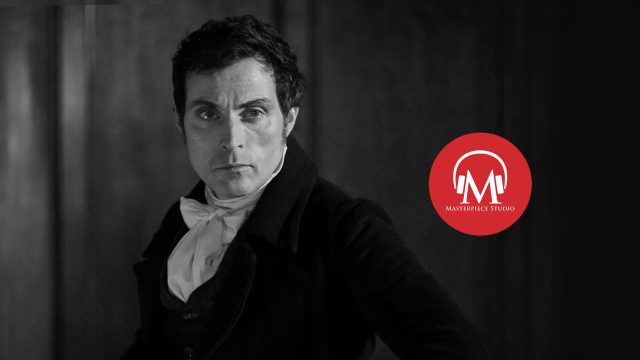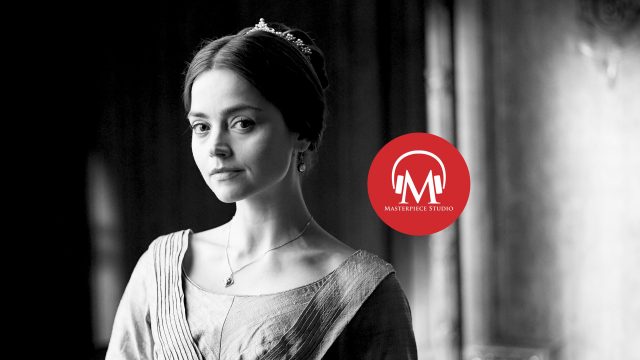Jace Lacob (Jace): Did you spot Victoria creator Daisy Goodwin in the latest episode of the show? If not, don’t worry. I didn’t either… The important thing is that you did see Episode 5 — even if you didn’t notice Daisy — so you’ll be safe from spoilers.
MASTERPIECE Studio is brought to you by Viking Cruises. See the world differently by exploring differently. Learn more at vrc.com.
Jace: I’m Jace Lacob and you’re listening to MASTERPIECE Studio.
As the story goes, Daisy Goodwin was fighting with her teenage daughter when she had a revelation.
CLIP:
Daisy Goodwin: And I just suddenly thought, “Hmm, that’s quite interesting. You know, what, what would happen if this- someone as tempestuous and as mighty as my daughter became queen tomorrow?”
Jace: The idea of the “teenage queen” formed the backbone of Daisy’s next project, a television script about the young Queen Victoria, which would morph into MASTERPIECE’s drama, Victoria.
As a writer and TV producer who has been studying Victorian England for the past 30 years, Daisy was perfectly suited to the task of bringing that story to the screen.
CLIP:
Daisy Goodwin: I sort of feel I understand the Victorian period better than I think I understand the 21st century (laughs).
Jace: Daisy also worked in all of the real-life drama of Victoria’s initial years as Queen — from the Bedchamber Crisis, to Lady Flora’s pregnancy scandal, to Victoria and Lord Melbourne’s maybe too-close relationship.
CLIP:
Daisy Goodwin: Yeah we’ve all got a bit of a crush on Melbourne.
Jace: Since Daisy Goodwin has the inside scoop on all things Victoria, she joins us now to look back at the drama — both real and imagined — and to tell the story behind her not-so-secret cameo.
And this week, we are joined by Victoria writer Daisy Goodwin. Welcome.
Daisy Goodwin (Daisy): Hi, there.
Jace: This is one of two Victoria projects with which you’re involved. How did you get involved with this TV project initially, and was it related to your next book?
Daisy: Well, absolutely. So, I was writing a novel set in the 1870s, and it was all about Victoria and John Brown. And, as I was doing my research, I thought, “Actually, nobody has done a TV series about Victoria.” I mean, amazingly they haven’t. And I thought, “Well, maybe I shouldn’t be writing a novel; maybe I should be writing a screenplay.” And then I thought, “Well, if I’m going to write a screenplay, I’d have to start at the beginning.”
So I had this thought, and then I had a row with my fifteen-year-old daughter who, like Victoria, was five foot nothing (laughs) and I just suddenly thought, “That’s quite interesting. What would happen if someone as tempestuous, and as short, and as mighty as my daughter became queen tomorrow?”
Jace: (Laughs)
Daisy: (Laughs) It was just a place from which the drama seemed to flow naturally. I just had this idea of the teenage queen. And then I thought, “Right.” So, I started writing the screenplay, and then, halfway through the screenplay, I thought, “But actually, I should also write a novel at the same time.” So the minute I finished the screenplays, I started writing the novel. The novel is, I suppose (laughs) all the scenes that got cut out of the screenplays, because we ran out of time. But it also gives me a chance to paint a picture.
Jace: As the author of The American Heiress and The Fortune Hunter, you’re no stranger to the Victorian period. Uh, What is it about the period that inspires you?
Daisy: I think it’s such an interesting time because it’s a moment in British history where so much is happening. Things are changing so fast, and women’s lives are changing so fast. Women can’t vote; until 1858, they are the legal property of their husbands, which is incredible, and I suppose I find that fascinating.
I mean, the 19th century is still very much around in Britain. The recent Brexit vote, I think you can relate that straight back to what was going on in Victorian England. And in fact, it has been very weird for me because I wrote the series before the Brexit vote, and now when I watch it, I find it almost uncanny because it’s full of lines like, “Well, we won’t be ruled by Germans.”
Jace: (Laughs)
Daisy: And you realize that actually, xenophobia, “Little England” stuff, insularity, there’s nothing new about any of that.
Jace: There’s a trove of research material available. Like you, Queen Victoria was a lifelong diarist.
Daisy: Yes.
Jace: How did you decide what to delve into, what accounts to read? And were you ever overwhelmed by the sheer amount of words that are out there?
Daisy: I wouldn’t say I was overwhelmed. I’ve been very lucky because I started studying Queen Victoria when I was about 19, so I’ve had quite a long time to get up to speed.
I’m not scared of taking a line, if you know what I mean, because I think it can be very overwhelming if you come to a subject from scratch, but when you’ve spent thirty years reading about it and getting under the skin of it, I feel- I know how the characters talked, what they ate for breakfast, what their clothes felt like to wear, how they smelled. I mean, I feel I understand the Victorian period better than I think I understand the 21st century (laughs).
So, I’m not scared of it. I’m not intimidated by it, and I feel that I know as much, pretty much, as most biographers, in fact.
Jace: Now, in the original script for the first episode, there’s a framework narrative set up…
Daisy: Yes.
Jace: … which doesn’t make its way into this first season.
Daisy: Yes.
Jace: I’m wondering how you looked at structuring this first season. Did you know going in where you wanted to end Season 1?
Daisy: (Laughs) Well, I had never written a screenplay before, and so, I have to say I had no idea what I was doing.
Jace: (Laughs)
Daisy: I thought maybe we’d end in 1850 with the Great Exhibition, but what became very clear the moment I started actually writing this was that it works better the more you slow it down, because you want to know what’s happening in real time. You want to see characters progress organically rather than just suddenly coming in at certain, specific points.
And although I’ve tried to keep the history very real, and very much part of it, it is an emotional story. It’s about one woman and her search for, “How does she keep her identity? How does she become a queen? Can she be a queen and a wife? Can she be a queen and a mother?” All these things are really interesting questions to explore, because they’re quite modern dilemmas in many ways.
Jace: Now the early episodes focus on the rapport between Victoria and William Lamb, Lord Melbourne, which is at times romantic and paternal. What were they to each other, and what did you seek to capture about their dynamic?
Daisy: Well, I think it’s such a touching love story. I think, she was his lost love and he was her first love.
He’s such an attractive man, Melbourne, you know, he’s so funny, and clever, and he’s reluctantly Prime Minister, but he has got to do it because there’s no one else, and he doesn’t take himself seriously at all. He has got this very tragic past when his wife ran away with Lord Byron. They had this child together, who had quite bad epilepsy, and yet, at a time when children with disabilities were sent away, he looked after this child and absolutely adored him, and that was his only child.
So, he’s a very attractive character in that sense, and I think he found Victoria absolutely captivating, because, you know, she depended on him and she needed him, and I think he found that really appealing. And for her, he was the first person who took her seriously for her own account, and he educated her. I mean, he taught her how to be queen.
CLIP:
Victoria: Can’t I do something about it as queen? If it is known that I support abolition…
Lord Melbourne: Well, I’m sure the Liberals would applaud your good sense and the Tories would think I filled your head with bunkham.
Victoria: And if I insist?
Lord Melbourne: You cannot, ma’am. Advise, yes; encourage, certainly; even warn, but you cannot insist.
Daisy: They went riding every morning. They had dinner together. I mean, they were inseparable for three years, and then, Albert turns up and sex rears its ugly head. So, what I’ve tried to do is to dramatize that relationship. So, there’s the scene where she goes to Brocket Hall, and the rooks- what I call the rook scene.
Jace: Oh, the rook scene, yes.
Daisy: Yeah.
CLIP:
Victoria: The butler said you would be here.
Lord Melbourne: I come here for the rooks. They are sociable animals. A gathering like this is called a parliament; altogether more civilized than the human equivalent.
Daisy: I mean, he was very keen on rooks, that’s true. He was a rook enthusiast-
Jace: (Laughs)
Daisy: So that’s a gift for a writer because it gave me something to- and I was reading about rooks and I got this thing about “rooks mate for life,” and I just thought it was such a wonderful image, and…
Jace: Such sad foreshadowing, too.
Daisy: I know.
Lord Melbourne: No you must keep it intact for someone else. I have no use for it you see. Like a rook, I mate for life.
Daisy: But although, that encounter was something I made up, I feel sure that that was basically the tenor of their relationship. She would have liked more, he knew that could never happen, and so he was constantly having to keep this very passionate young woman at arm’s length you know, probably he, he would have liked to have more, but he knew his duty was not to do that, because he was a gentleman, you know.
Jace: Now, we know Victoria and Albert are going to end up together. We know that historically. What is it about their natures that clashed so early on? Why is she so resistant to the idea of Albert?
Daisy: Well, I think part of it is that Albert is her mother’s idea of the perfect husband. I mean, she cannot stand her mother, who she has a very love/hate relationship with. And also, he’s charmless. He comes in and he disapproves of her, and she’s not used to that. She’s used to lovely, charming Lord M.
Jace: (Laughs)
Daisy: Who is always at her side and makes her feel good about herself. And then, suddenly Albert comes in and is, frankly, quite rude, but sexy.
CLIP:
Victoria: Do you think Cousin Albert disapproves of us, Dash?
Albert: Forgive me. I thought you were addressing your dog. I think this gentleman has produced a remarkable invention so I find nothing to laugh at.”
Daisy: That is quite a challenge for her, I think, as a woman. So it’s that thing of, “Do you want flattery or truth?”
Jace: My favorite description of Britain may just be Albert’s. He says, “The dogs wear jewelry…”
Daisy: (Laughs)
Jace: “…the pianos are all out of tune, and all anyone talks about is the weather.” (Laughs) As they’re both outsiders are Victoria and Albert perfectly suited for one another?
Daisy: I think, yes. I think, one of the things that I feel bonds them together is that they’ve both lost a parent; she doesn’t have a father and he loses his mother when he’s five years old. That cements their union because they’re both looking for the thing they never had, and they find it in each other.
Jace: Now, Victoria does not intend to let every royal tradition survive out of obligation. In an interview with the Independent in 2010, you defend your title of head girl…
Daisy: (Laughs)
Jace: …by saying, “Women who run companies can do things differently. We don’t have to ape male corporate structures.”
Daisy: (Laughs)
Jace: Do you feel that’s what made Victoria a successful monarch as well, a desire to just do things her own way?
Daisy: (Laughs) Yes. I mean, for example, when she gets married, she says, “I’m going to wear white.” No one had ever worn white before to get married, but she wants to show that she’s not a queen getting married, she’s a woman getting married to a man, so she decides to go for the simplest, plainest thing she can find.
And, she’s absolutely not going to do what royal brides normally do, which is they all get put to bed by the courtiers, and after, in the morning, they show the sheet to indicate that sex has taken place. She’s not having any of that. She does things her way, like her name. The whole thing about choosing her name, which I think is fantastic. She calls herself, “Victory, Victorious.” And I think that sets the tone for Victorian England, doesn’t it?
Jace: I think so. I love the scene between Victoria and Albert when they talk about their mother leaving them behind.
CLIP:
Albert: I have seen the way she looks at you, Victoria.
Victoria: She loves you very much. You don’t know anything about it.
Albert: No. No. That’s… That’s true. But I do know what it is like not to have a mother.
Jace: It’s so precisely rendered and heartbreaking. You’ve written a lot about your relationship with your mother.
Daisy: (Laughs)
Jace: Did you draw on your own experiences when writing that scene? It just feels so specific.
Daisy: Well, you’re very good at your research. Yes, I absolutely did. I mean… I guess, yes. I mean, my mother left home when I was five years old and I… It’s a defining moment for me, so I suppose I have huge sympathy for Albert, because I understand that pain.
I think it makes him very wary of women, and so I think that’s why he’s resistant to Victoria, and he has to feel that he can trust her because the only woman he’s ever loved has deserted him. So, yes, there’s a lot of my own experience in Victoria. I mean, (laughs) I had quite a difficult relationship with my stepfather, so I suppose I’ve drawn on that for Conroy.
They are all historical figures, but I suppose emotion is something that you can only find in your own experience, really.
Jace: Up until now, we’ve seen Albert searching for an identity of his own…
Daisy: Yeah.
Jace: …that makes him more than just an accessory for the Queen. He finds it in giving the Exeter Hall speech.
Daisy: Yes.
Jace: How important was this moment, both in terms of solidifying Albert’s public brand, as it were, and for his own peace of mind?
Daisy: I think it was key, actually, and I was so delighted when I discovered it, because it’s not something that’s… It’s one line in the biographies. It’s not a huge deal, but when I was trying to kind of think about who Albert was, to discover that his first public appearance was to make a speech against slavery seemed to me a wonderful… It defined him as a person. And he’s doing something that isn’t fashionable. He’s doing it because he really believes in it.
CLIP:
Albert: This barbarous trait, is repugnant to Christianity and the blackest stain upon civilized Europe. Mankind, born and brought up in a civilised society are physically and morally speaking…
Daisy: I found that very moving, actually, and the fact that he’s giving a speech in a language that isn’t his own… I don’t think his English was that good, and the ridicule… I mean, he was ridiculed by the English aristocracy for being German, for wearing weird clothes, and speaking with a German accent. They didn’t think he was grand enough to be married to their Queen.
So, I think it was a very brave thing, and that’s what I’ve tried to convey, that it was important for him both personally and politically. And for him to have something to do where he can do good… Because that’s the thing. I think Albert was actually exceptionally clever, terribly able. So, he has got all these talents and he needs a way to express them.
And I think, it’s quite interesting that the two things that happened in that episode, one is the precedence thing, which is terribly important. If you’re at a court precedence becomes the most important thing…
Jace: (Laughs)
Daisy: …you can imagine. I mean, to us it seems bonkers, “Who cares who goes first into dinner?” But, if you’re in a 19th century court, your whole status depends on that.
And then the Exeter Hall thing. So, these two things… I mean, they’re both true and I’ve just tried to make them mirrors of each other, in a way.
Jace: We find out this week as well Eliza’s secret that she’s actually Nancy.
Daisy: Yes.
Jace: She comes from a “nunnery,” or whore house. There’s a beautiful scene where Francatelli makes her this sugar work “N,” and places it on her pillow and I love- she lifts it up and breathes it in. Is there a possibility that Francatelli might actually care for Eliza slash Nancy?
Daisy: Yeah, I think, definitely. I think he feels that she is an independent woman; she resists him; she’s not a pushover, and I wanted to play… I hope that when you’re watching that scene, you think that he’s going to try and force himself upon her, but actually all he wants is her name, and I thought that was… Sorry, I’m sounding like I didn’t write it myself.
Jace: (Laughs)
Daisy: But I was rather pleased with that, and I rather loved that– that that’s all he wants. And, yes, I rather love Francatelli; he’s one of my favorite characters.
Jace: I like him too. I like Eliza…
Daisy: Yes, yes.
Jace: … slash Nancy quite a lot.
Daisy: Yeah.
Jace: I mean, for a woman like Nancy, was there any sort of upward mobility at a time of intense social structures such as this one?
Daisy: Well, yes. If you remained unmarried, the fact that she becomes a dresser- that’s a great place to be if you’re a 19th century woman, because you’ve got your own income, you work in the royal household, everything’s taken care of, and you’ve got status without having to be married. So, although being not married was social failure in some ways, for a lot of women, if you get married and have children, you’re putting your life in danger every time you have a child, and you can’t be independent. So, it’s quite an interesting dilemma.
So, if you’re someone like Eliza slash Nancy, who has got her own job, her own income, she says this, she has got everything she needs. Why does she need a man?
CLIP:
Skerrett: The Queen will be happier when she’s married.
Francatelli: Isn’t every woman, Ms. Skerrett?
Skerrett: Not this one. Give up 25 guineas a year and my laundry all found for a man and a house full of children? Not likely. The Queen needs a husband. I most certainly do not.
Jace: We’re at a time now where Theresa May is Prime Minister of England. What lesson could today’s politicians learn from Victoria?
Daisy: Wow, that’s a very interesting question. I think, one of the things I really like about Victoria is that she doesn’t obsess about her image. She was famously badly dressed (laughs) and it really didn’t bother her at all. I mean, she knew who she was, and I think she had a very strong sense of her own identity, and she didn’t spend too much time trying to please other people. And I think, for powerful women, I rather like that.
She sort of defined how you could be powerful, and also be a wife, and also be a mother to nine children. And she didn’t compromise, I think, in any direction, and I think that’s really interesting.
I mean, I’ve said in a glib way that she’s the first woman to have it all. But I feel she is, in a way, because she’s certainly the first queen of England to get married while she’s on the throne and have children while she’s on the throne, and that in and of itself is an extraordinary thing.
That’s why I keep drawing parallels between her and Elizabeth I, who stayed queen because she didn’t get married. She made a deliberate decision not to get married, and she had to, because she knew that if she got married, she would lose power. But Victoria managed to get married and have an equal marriage with a man who she loves. She holds on to her own sense of self and her own vision, so I think that’s (laughs) that’s really impressive.
Jace: You mentioned the rules of succession. I loved that Victoria comes up with a scheme to give out this discretionary title of Duchess of Inverness.
Daisy: Yes (laughs).
Jace: In order to make her Uncle Sussex happy and arrange things so she can walk in with Albert.
It’s Wellington who remarks that Victoria is using everything in her arsenal.
CLIP:
Wellington: Good evening, Your Royal Highness. Lady Cecilia.
Sussex: Actually, Wellington, my wife is now Duchess of Inverness.
Wellington: A discretionary title? The Queen has deployed her arsenal. My congratulations, Duchess.
Duchess of Inverness: Duke.
Jace: Why does he, and why do the men still continue to underestimate her at this point?
Daisy: Well, because they’re just not used to being outsmarted by a young woman. I mean, Wellington’s the victor of Waterloo, and… You know, of course, who plays the Duchess of Inverness, don’t you?
Jace: No, who is that? Oh it was you? I didn’t even realize that. That’s quite good.
Daisy: (Laughs) I thought I must have a walk-on part in it somewhere, so I thought “Well, it’d be quite funny…” David Bamber, who plays the Duke of Sussex, is a bit smaller than me, so I thought it would be quite funny, because I had this vision of Lady Cecelia towering over the Duke of Sussex (laughs).
So I said, “I’m going to play the part.” And it was meant to be just a walk-on (laughs). And I kept adding lines (laughs). In the end, Tom and Jenna kept saying, “Hang on, hang on! How many lines are you gonna have here?”
Jace: (Laughs)
Daisy: You know, “Stop stealing the scene.” (Laughs)
Jace: That’s fantastic.
Albert reaches out to Robert Peel after the speech at Exeter Hall, and he says,
CLIP:
Albert: This time, it seems, we’re both on the same side.
Jace: Can Albert temper Victoria’s more tempestuous side and perhaps mend those bridges that youthful indiscretion perhaps is burning?
Daisy: Absolutely. I mean, he was key, actually, to Victoria coming to realize that, just because she’s queen and because she can appoint and dismiss Prime Ministers, it doesn’t mean that she should.
Robert Peel and Albert represent the new Victorian England. They’re both attracted to progress, and they’re both are looking with hope and interest into the future, whereas Melbourne is looking backwards. And I think, Albert and Peel are from the new generation and Melbourne’s of the older era…
Jace: Fading away.
Daisy: Fading away, although, god, so charming, and lovely, and you know…
Jace: (Laughs)
Daisy: Yeah, we’ve all got a bit of a crush on Melbourne.
Jace: Now, there are two episodes left this season.
Daisy: Yes.
Jace: What can you tease about these final two episodes?
Daisy: Well, if you like trains, you’re in for a treat. (Laughs) You don’t need a writer’s room to… I mean, there are so many story lines in Victoria, all of which are true, you’ve got life, death, the whole shebang. So, as a season finale, I think it lives up to its name.
Jace: Now, it’s a bit like having to choose among your children, but do you have a favorite scene that you wrote this season?
Daisy: Well, I am, as you’ve no doubt figured out, a hopeless romantic, so my two… Well my favorite scene is probably the rook scene. I love the rook scene because it all worked out so beautifully. The other scene that I absolutely love is the proposal scene, because they did it so beautifully.
CLIP:
Victoria: Albert, will you marry me?
Daisy: And I was there when they shot it and I said, “Well, you must pick her up at the end,” and it worked so brilliantly, and they looked so beautiful together and it’s just… Every time I watch it, I think… Oh, and there’s one more scene when… I’m sorry, I love all my children, but-
Jace: (Laughs)
Daisy: But the moment when Victoria says goodbye to Melbourne for the last time, that was heartbreaking. In fact, when we shot that, the crew were in tears, especially when she runs off. She just skips out into her new life and she doesn’t look around, and he does. That always makes me well up.
Jace: I actually said aloud at that point, “Don’t look back,” but he did.
Daisy: Yeah, yeah, he did. Yeah, yeah.
Jace: Would you want to take this all the way to 1901?
Daisy: (Laughs)
Jace: Take it all the way to Victoria’s death?
Daisy: I don’t know. In theory, yes, I’d love to. It has been quite an intense period writing this show so I can’t quite imagine it now. But yes, I would love to because it’s such an interesting period of history, and she has these nine children who are all uniquely peculiar and great characters, and there’s so much to write about them. I’d have an enormous amount of fun doing it, but we’ll see. I mean, (laughs) I don’t know. I might not still be alive by then. She might outlive me (laughs)
Jace: Daisy Goodwin, thank you so much.
Daisy: Well thank you. What a great interview. I’m thrilled. And it’s so nice to be interviewed by someone who has really thought about what I’ve done. So thank you so much.
Jace: I love this season so much.
Daisy: Thank you.
Jace: I love that you love the rook scene, too. I take a lot of notes when I watch; I actually wrote, “The rook scene,” and underlined it.
Daisy: Oh, the rook scene, so that’s…
Jace: It’s such a good scene.
Daisy: It’s funny, because it was one of those things I wrote at the last minute because we just thought, “We need something else here.”
It’s one of those things that, literally, I wrote in about ten minutes, but it just worked. It was that thing about the rooks rebuilding their marriage every year, I just thought it was such a great image.
Jace: The nest, and…
Daisy: Yeah.
Jace: It just is… That stuck with me.
Daisy: Yeah, and my other favorite bit is when they’re… I (laughs) loved the bit when Albert and Victoria play the duet for the first time, (laughs) and she goes, “Am I going too fast for you here?”
Jace: (Laughs)
Daisy: And he goes, “No, you’re going too fast for Schubert.” (Laughs) That’s the first time you think, “Oh, yeah. No, he’s funny. He’s not just a…”
Jace: The show is funny…
Daisy: Yeah.
Jace: …and that’s what I love, too. As you said, it’s sort of light and dark, and we get both. The stamp scene, I think, is such a great example of that.
Daisy: Yeah.
Jace: It’s just… They’re so good.
Daisy: Yeah.
Jace: But I loved it.
Daisy: Oh, I’m so pleased.
Jace: Recommission, ITV. Recommission.
Daisy: Well, let’s hope so, yeah.
Jace: It’s almost as if ITV heard our call… We did this interview with Daisy back in July, and two months later ITV announced that Victoria would get a second season.
CLIP:
Jenna Coleman: Next year should be very interesting.
Jace: Until then, be sure to watch the final two episodes of Season 1 Sundays at 9 pm ET on MASTERPIECE.
CLIP:
Jenna Coleman: I think their relationship still has a long, long way to go.
Jace: Then, you can hear Jenna Coleman and Tom Hughes — Victoria and Albert themselves — on the podcast Sunday, March 5th, right after the season finale.
If you think that you might forget about their interview by the time March 5th rolls around, be sure to subscribe to MASTERPIECE Studio on iTunes or Stitcher so that their episode is automatically downloaded to your listening device.
You can also check out the podcast on our spiffy new website, pbs.org/masterpiecepodcast.
Last but not least, there’s only one month left until the ‘MASTERPIECE 2017 Sweepstakes!’ closes. You have from now until March 15, 2017 to enter for a chance to travel to the UK – and more. Go to pbs.org/sweepstakes for prizes and details.
MASTERPIECE Studio is hosted by me, Jace Lacob and produced by Rachel Aronoff. This episode was edited by Kathy Tu with help from Elisheba Ittoop. Special thanks to Barrett Brountas and Susanne Simpson. The executive producer of MASTERPIECE is Rebecca Eaton.
Sponsors for MASTERPIECE on PBS are Viking Cruises, Farmers Insurance, and The MASTERPIECE Trust.








